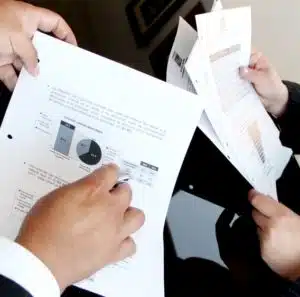Are you an office manager, intern, or other non-accountant professional responsible for bookkeeping in your company? There are many things to keep track of while managing your company’s books, which can often seem complicated. However, there are simple record keeping best practices you can follow to ensure you maintain good record keeping in the office. This will allow you to keep your boss informed and your outside accountant happy with clean reports.
Review Frequently
It’s recommended that you keep the books up-to-date by looking at them every day or at least every week. This frequent review not only keeps the bookkeeping task from being a daunting project but helps you always be ready to provide the most updated and accurate information to others.
Whether your boss asks what bills are due, or a customer asks for their current open invoices, if your bank accounts aren’t reconciled and incoming and outgoing checks aren’t recorded, you risk giving the wrong answer to those questions. Likewise, if an outside tax accountant will be helping your company determine estimated tax responsibilities, it is essential to have updated information to receive the most accurate estimates.
When you start not having time to touch your books at least weekly, that’s one of the signs that it’s time to hire someone else who can help make sure everything is correct before it becomes a problem.
Store Backup
When Szweda Consulting does your bookkeeping, we leave a trail in our wake, so if another accountant takes over, he can easily understand what we recorded and how we reached that conclusion. With that in mind, provide a description of each transaction in the digital record or attach the PDF receipt. What may be evident to you may not be easily understood by others. The description needn’t be long or detailed, just enough so that someone else would know what the entry is for.

This can cut down on the questions that an outside accountant has to pose to a client. When we review records at tax time, if we can check notes and receipts, this will help us resolve questions without reaching out to you. For example, determining whether a purchase is an asset or an expense or whether prepaid insurance was accrued accurately can be easily verified if just a little backup is present.
Receipts are also crucial in the event of a tax audit. Having a system that can easily be searched will save a lot of time and money if an audit ever occurs. Physical filing cabinets work fine, but we recommend digital receipts be uploaded into each QuickBooks transaction for easy reference later on if need be.
Document Your Processes
Make sure that you always have a bookkeeping system in place. It doesn’t matter if your system is an off-the-shelf accounting software or your own manual process, as long as it’s easy to use and complete. Document what you use, when you use it, and how. Such a document is helpful in many scenarios:

- Provide auditors information on procedures
- Create a training manual or instructions for new hires
- Know what to include in job descriptions for new hires
- Provide instructions on how people should support you when you are sick or on vacation
- Help an office of multiple locations or employees ensure no one is duplicating work
These processes don’t have to be highly detailed. You aren’t writing a textbook for someone from a completely different industry. We recommend just starting with some bullet points. As you perform a task, have Word opened on your computer and make quick notes about what you are doing, where you are going to access files, and where you send deliverables. Later on, you can go back and add more details if needed.
Mind the Date
One of the most important record keeping tips is to make sure that you record transactions accurately. The role of an accounts payable clerk may seem tedious, but it is essential and has a significant effect on the company’s books beyond just bill pay.
As you are recording bills, quickly review the document to determine when the service was provided. Always date the bill in the month the goods were acquired or the service was provided. This will produce the most accurate financial reports and best match up your expenses to your income.
Take, for example, a monthly recurring subscription for $1000. Your reporting should show $1000 each month. However, suppose the mail is a little late, and you don’t get June’s bill until July. Then you get July’s bill in July as well. In that case, if you are dating bills when you receive them. June will show no expense, and July will be double.


